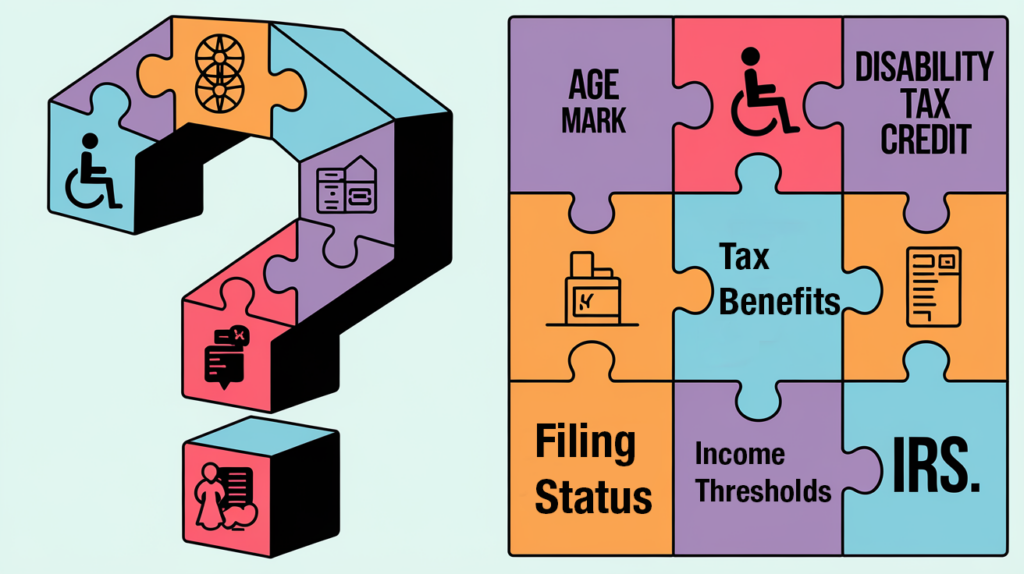The U.S. tax code offers various credits and deductions to help individuals reduce their tax liability. One such credit, officially known as the Disability Tax Credit (DTC), can significantly benefit eligible taxpayers. This comprehensive guide explores who qualifies for this credit, the criteria they must meet, and how to calculate and claim it.
Key Takeaways
- To be eligible for the Disability Tax Credit, individuals must be retired due to permanent and total disability and receive taxable disability income without reaching the set retirement age.
- Eligibility depends on both the adjusted gross income (AGI) and non-taxable benefits thresholds.
- Taxpayers use Schedule R (Form 1040) to claim the credit, with an option for IRS-assisted calculations.
- Disabled individuals might also qualify for medical expense deductions and the Child and Dependent Care Tax Credit.
- Having a part-time job does not automatically disqualify you, but earnings and work conditions can affect eligibility.
Who Qualifies for the Disability Tax Credit?
The Disability Tax Credit is a nonrefundable tax credit available to U.S. citizens and resident aliens who meet specific criteria:
- Age Requirement: Must be at least 65 years old or permanently and totally disabled as certified by a physician.
- Disability Certification: A physician must confirm that the individual is unable to engage in substantial gainful activity due to a physical or mental condition expected to last at least one year or lead to death.
- Income Limits: Adjusted Gross Income (AGI) must be below specific thresholds, varying by filing status.
- Taxable Disability Income: Must have received taxable disability income during the tax year.
- Retirement Status: Should not have reached the mandatory retirement age at the beginning of the tax year. Mandatory retirement age varies by employer, and those required to retire due to reaching this age do not qualify for this credit.
In some cases, individuals with disabilities may need to provide a “Statement of Permanent and Total Disability” signed by a physician to support their claim.
How Does Filing Status Impact Eligibility?
Generally, if an eligible individual is married, they must file a joint tax return with their spouse to qualify for the credit. Those filing as “Married Filing Separately” do not qualify unless they did not live with their spouse at any time during the year.

What Are the Income Thresholds for the Disability Tax Credit?
Meeting the basic eligibility criteria is just the first step. The Disability Tax Credit also depends on income, with two separate income thresholds:
- Adjusted Gross Income (AGI) Thresholds (Tax Year 2024):
- Single, Head of Household, or Qualified Surviving Spouse: $18,000
- Married Filing Jointly with Only One Spouse Qualifying: $20,500
- Married Filing Jointly with Both Spouses Qualifying: $25,500
- Married Filing Separately and Living Apart from Spouse for the Entire Tax Year: $13,000
- Certain Non-Taxable Benefits and Pensions Thresholds (Tax Year 2024):
- Single, Head of Household, or Qualified Surviving Spouse: $5,200
- Married Filing Jointly with Only One Spouse Qualifying: $5,200
- Married Filing Jointly with Both Spouses Qualifying: $7,800
- Married Filing Separately and Living Apart from Spouse for the Entire Tax Year: $3,900
To qualify for the credit, an individual must meet both the AGI and non-taxable benefit thresholds.
How to Calculate and Claim the Disability Tax Credit
Calculating and claiming the Disability Tax Credit involves using Schedule R (Form 1040). Taxpayers have the option to let the IRS calculate and apply the credit for them by checking the appropriate box on Schedule R. However, many taxpayers prefer to calculate the credit themselves for a clearer understanding of their tax liability.

At XOA TAX, our CPAs will help you work through every piece of record to claim the maximum Disability Tax Credit.
Are There Other Tax Benefits for the Disabled?
In addition to the Disability Tax Credit, disabled individuals may be eligible for various other tax benefits:
- Medical Expense Deductions: Costs associated with special schooling or necessary medical care, such as therapy sessions or specialized equipment, may qualify as medical expenses.
- Child and Dependent Care Tax Credit: Married disabled individuals who require a paid caregiver due to their disability may qualify for this credit.
- State Tax Benefits: Check state-specific laws, as some states offer property tax exemptions and other benefits for disabled individuals.
Understanding and leveraging these tax benefits can significantly improve the financial well-being of individuals with disabilities and their families while ensuring compliance with tax regulations.
Frequently Asked Questions (FAQ)
Does having a part-time job affect the classification of being disabled for tax purposes?
When determining whether an individual is considered disabled for tax purposes, the concept of “Substantial Gainful Activity” (SGA) becomes crucial. The IRS uses SGA to evaluate if a person’s work activity is substantial enough to impact their disability status.
- Earnings Threshold: If your part-time job earnings exceed a certain level established by the IRS, it might indicate you’re engaging in SGA. These thresholds change annually, so it’s vital to stay updated.
- Nature of Work: It’s not just about hours or wages. The type of work and its impact on your overall functionality are also evaluated. Minimal duties may not affect the disability classification.
- Working Conditions: If your part-time job is adjusted to suit your disability (e.g., flexible hours, modified tasks), this could be viewed differently compared to standard competitive employment.
Having a part-time job doesn’t automatically disqualify you from being considered disabled for tax purposes. However, if the job demonstrates substantial gainful activity, it may influence your classification. Consult a tax professional or legal expert to understand how your specific situation aligns with IRS guidelines.
Can expenses for special schooling or similar items be considered medical expenses for tax purposes?
Yes, expenses for special schooling and similar items can be recognized as medical expenses for tax purposes if they address a specific medical condition. This typically applies if the primary purpose of the schooling is to provide medical care, such as therapy sessions or specialized instruction.
- Nature of the Instruction: The program must primarily benefit the individual therapeutically.
- Professional Recommendation: A doctor or qualified medical professional must recommend this educational setup.
- Documented Needs: Keep thorough documentation supporting the necessity of the schooling for treatment.
Always consult with a tax professional to determine the exact eligibility of your specific expenses to ensure compliance with the latest tax code and maximize potential deductions.
What constitutes substantial gainful activity according to the IRS?
Substantial Gainful Activity (SGA) involves performing significant tasks consistently over time in return for wages or profit. Engaging in a job position that typically pays, whether full-time or part-time to suit the employer’s needs, qualifies if it meets or surpasses the minimum wage standards.
Essentially, if you’re working in a competitive environment and earning at least what constitutes the minimum wage, it indicates your capability to participate in substantial gainful activity.
How does a child’s disability affect tax filing when they turn 19 or 24 if they are a full-time student?
When a child with a disability reaches the age of 19, or 24 if they are a full-time student, their status for tax filing takes on added significance.
- Qualifying Child Status: Despite surpassing the typical age limits, a child with a disability can remain a “Qualifying Child” for tax purposes. This designation allows a parent to potentially claim the child as a dependent indefinitely, regardless of the child’s age.
- Deductions and Credits: Certain expenses incurred due to the child’s disability, such as medical expenses or special schooling costs, can often be categorized and deducted as medical expenses on a tax return.
Understanding these nuances helps families navigate tax implications, ensuring they fully utilize applicable benefits while accommodating their child’s ongoing needs.
Does a medical diagnosis of autism automatically qualify someone as disabled for tax purposes?
No, a medical diagnosis of autism does not automatically qualify someone as disabled for tax purposes. To qualify, the individual must meet the IRS’s guidelines for defining a “disability.” Specifically, a child must be unable to participate in significant work activities due to a physical or mental condition that has been present for at least a year or is expected to result in death.
- Age: There’s no age cap for children with disabilities, but evidence like a medical assessment is required.
- Relationship: The child should be directly related to you, meaning they could be your biological, step, foster, or adopted child.
- Living Situation: Your child should have lived with you for the majority of the tax year.
Consult a tax professional to ensure compliance and optimize potential tax benefits related to disability.
Can I get a credit or deduction if my child is disabled?
Yes, caregivers for individuals with disabilities might be eligible for the Disability Tax Credit if the person they care for meets the credit’s criteria. Eligibility hinges on the severity of the disability and its impact on daily activities. Additionally, certain conditions allow for claiming medical expenses and the Child and Dependent Care Tax Credit.
- State Tax Laws: State tax laws may offer different benefits for having a disabled child. Always check state-specific regulations.
- Dependent Claims: You may be able to claim your child as a qualifying child dependent on your federal tax return if they are 19 or older and disabled.
- Childcare Credit: If your child over 12 is disabled and requires care while you work, you can claim the childcare credit.
While federal tax advantages are limited, state-specific benefits can provide additional support. Consulting a tax professional can help maximize any potential benefits.
What is the definition of disability according to the IRS?
According to the IRS, an individual is considered disabled if they are unable to engage in substantial gainful activity due to a medically determinable physical or mental impairment. This condition must either be expected to result in death or last for an extended and indefinite period.
- Medical Criteria: The impairment must significantly limit one or more major life activities.
- Substantial Gainful Activity: Involves performing significant duties for pay or profit consistently over time.
- Proof Required: Medical documentation and a “Statement of Permanent and Total Disability” may be required.
Understanding these definitions is crucial for accurately determining eligibility for tax benefits related to disability.
The Bottom Line
The Disability Tax Credit (DTC), along with various other disability-related tax benefits and financial support programs, can significantly alleviate the financial burdens faced by individuals with disabilities and their caregivers. It’s essential to understand the available options, follow the proper application process, and seek professional guidance when needed to maximize the benefits.




 anywhere
anywhere  anytime
anytime